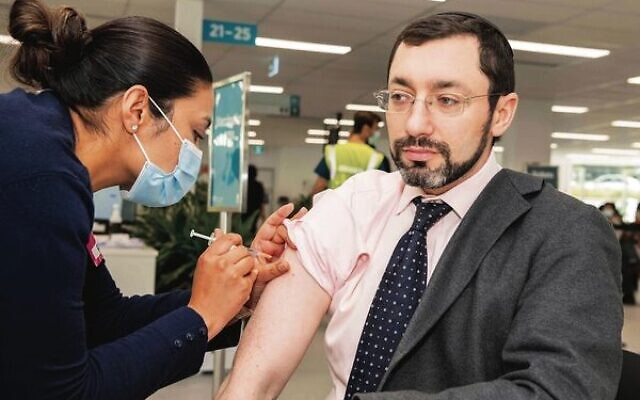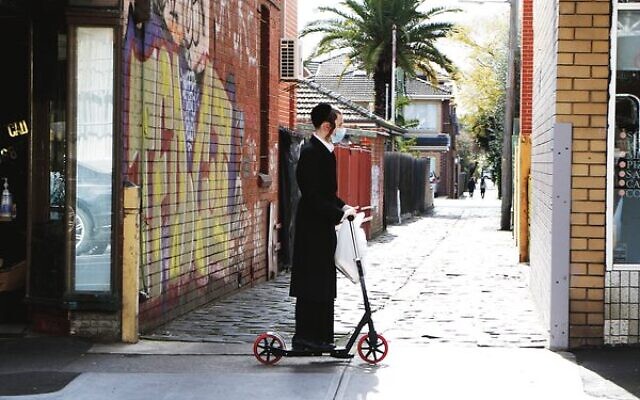The community reflects following WHO COVID19 declaration
While the Australian Jewish community and others continue to feel the ongoing effects of COVID-19, we proved united throughout the pandemic.
The World Health Organisation (WHO) recently declared that COVID-19 is no longer a global health emergency, which was welcomed by many around the world who have been affected by the pandemic over the past two years.
However, the Australian Jewish community and others continue to feel the ongoing effects of COVID-19.
Jewish Community Council of Victoria (JCCV) president Daniel Aghion acknowledged the pandemic as a challenging time for the community. However, he also noted that the community became more united and supportive through the pandemic.
“Our community lost fathers and mothers to COVID-19. Many of our elderly people suffered from social isolation and our youngest people missed out on educational and social opportunities. But our community also became more united through the pandemic,” he said.
He also noted the way in which the Jewish organisations around Melbourne delivered new programs in new ways and “reinforced how we are at looking out for each other”.
“The JCCV sees that a more cohesive and supportive Jewish community has emerged as a result of the social, emotional and financial demands of the pandemic years.”
JCCV CEO Judy Fetter added, “The central role of the JCCV enabled us to work directly with the Victorian government and local councils to ensure our community knew how best to protect ourselves from illness and be aware of various support mechanisms to assist with our lives through lockdowns.”
Hatzolah general manager Josh Wonder told The AJN the organisation is continuing “to work closely with Ambulance Victoria in assessing the risks of COVID and are constantly reviewing our on-going response”.
Throughout the pandemic Hatzolah “supported the community with timely health advice and by responding to unwell community members, many times ‘in the line of fire’ of the virus.”
“Every community was challenged to respond to the COVID pandemic, but I’m not aware of any other that did so more effectively, rapidly, or with more emotional connection than ours.” JCA CEO Alain Hasson
Jewish Care Victoria acknowledged the WHO’s announcement does not mean that COVID is truly over and is “mindful that COVID-19 is still very active in our community”, director of clinical governance, risk and experience Gayle Smith said.
Director of community and donor relations Vanessa Cohen told The AJN, “The generosity of the Jewish community during the COVID crisis was incredible, those who could stood up when it was most needed and we at Jewish Care are forever appreciative.”
Australasian Jewish Medical Federation (AJMF) Victoria president Jack Green said, “We still need our health service to deal with this virus as an ongoing public health issue. There is also the phenomenon of long COVID that has become apparent. This virus is likely to be with us for some time.”
However reflecting on the past few years he said, “The Jewish community has done a great job in tackling the issues that have arisen with challenges of the COVID pandemic. Some leading medical practitioners in our community have been at the forefront of that effort.”

Despite the longer lockdowns in Melbourne, those in Sydney also suffered through two years of restrictions, including stay-at-home orders, limited social gatherings, and mask mandates.
Wolper Jewish Hospital president Richard Glass, who was in the thick of the community’s organised pandemic response, emphasised that the WHO’s announcement “did not mean that COVID is no longer a global health threat”.
“New strains are constantly emerging, with each successive strain generally more transmissible but thankfully, to date, no more lethal,” Glass said, adding, “Australians are beneficiaries of the progress made through mass immunisation and/or having had COVID at least once, the availability of anti-virals, and generally increased awareness of the benefits of air circulation and filtration to reduce infection risk.”
He noted, however, that in NSW there are currently 1300 people in hospital due to COVID and 53 people have been reported as dying from COVID in the last seven days, “so COVID is still with us”.
“The Jewish community has done a great job in tackling the issues that have arisen with challenges of the COVID pandemic. Some leading medical practitioners in our community have been at the forefront of that effort.” Australasian Jewish Medical Federation Victoria president Jack Green
He also recommended that people get their flu shots as soon as possible and stay current with their COVID vaccinations.
JCA CEO Alain Hasson told The AJN how “humbling” it was to see the Jewish community come together and provide additional assistance for those in need during the pandemic.
“Every community was challenged to respond to the COVID pandemic, but I’m not aware of any other that did so more effectively, rapidly, or with more emotional connection than ours,” Hasson said.
“In fact it was truly humbling for me as a still relatively new CEO of JCA at the time to see the generosity, support and kindness with which our community responded. Just a few weeks into the crisis, on Thursday, April 2, 2020, JCA together with JewishCare announced the provision of a $1 million Jewish Emergency Relief Fund to assist families in financial crisis.
“Three days later we announced an emergency funding pool of up to $18 million to ensure that no critical community services or operations would be disrupted, and that any additional emergency support services – in areas such as welfare, aged care and mental health – could be ramped up without concern by those service providers as to how this would be funded.
“JCA was able to respond with these commitments thanks to foundational reserves and bequests built up over the past 50 years in collaboration with significantly generous donors who stepped forward with additional support to plug any urgent gaps. This combined resolve would ensure that our organisations emerged from a once-in-a-century crisis with renewed ability to support our local Jewish community on a sustainable basis.”
Since restrictions have eased, attendance at shule is back up, according to Rabbi Ben Elton from The Great Synagogue in Sydney, who said people really want to have that “communal experience” again.
“It was almost like time stopped when we came back after two years, and people were no longer attending,” Rabbi Elton told The AJN.
“But then other people have started coming and I think we’ve just got back [to previous attendance levels] quite recently.”


comments